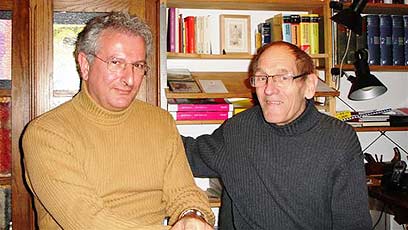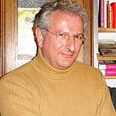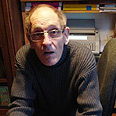An unusual meeting: For children of Holocaust survivors, a meeting with Wehrmacht soldiers or their children is loaded. But some of them are prepared to overcome the past and to meet with Germans whose parents served in the army that killed six million Jews during the Holocaust.
One of those who did this is Professor Eli Somer, who met in Berlin last week with the son of Hitler’s military adjutant.
Professor Somer, a clinical psychologist from the Haifa University School of Social Work, went to Berlin as part of a joint project of the Alice Salomon University in Berlin and Haifa University.
The oldest child of Holocaust survivors, Professor Somer wanted to meet people involved in the Nazi regime. His guest in Berlin, whose grandfather was an S.S. officer, arranged two meetings for him.

Professor Somer (left) with Professor Friedrich Hossbach Junior
One of the meetings was held in the home of 78-year old Professor Friedrich Hossbach, whose father was the decorated military adjutant to Adolf Hitler. Hossbach showed Somer two photos of himself with the German Fuehrer.
Says Professor Somer, “He took out two photos, one of him as a boy of eight, photographed with Hitler and another two children as well as the Minister of Propaganda, Joseph Goebbels. In the other picture a 14-year old Hossbach is shown in a Hitler Youth uniform shaking Hitler’s hand.”
His German host remembers his father well. A photograph of his father the general, decorated with medals, hangs proudly in the study of his home. Somer notes that “on the one hand he apparently loved his father very much, and this is evidenced by the photo that is still hanging in his home. On the other hand, it was clear that he was ashamed of his father’s past.”
Hossbach explained to Somer what he had absorbed as a child during the Third Reich.
“Among the stories it came out that he understood that Germany was surrounded by enemies and that it had to fight for its existence. He said that from time to time young people heard ideological lectures from senior Wehrmacht officials, and he claimed that he thought they were ridiculous. Hossbach also showed me a notebook and homework he received as a child in which he used graphs to describe his family’s racial purity,” said Somer.
'Remembered as someone who went against Hitler'
But Hossbach wanted to remember his father in a different way, perhaps as a man who went against the Nazi regime toward the end of the war.
“Hossbach said that his father received an order to fight on the Russian front till the last soldier, but he decided to withdraw with his regiment and disperse it. The day after his father arrived home the Gestapo surrounded the Hossbach family home, and there were exchanges of fire between the soliders and officers from the father’s unit and the German secret police.
"They did not surrender and continued to fight until the American army came. I got the feeling that this is the way he wants to remember his father, as someone who ultimately went against Hitler.”

Hitler (right), Hossbach (center) and Goebbels (left) (Reproduction: Eli Somer)
Although during their meeting Hossbach tried to hide his father’s closeness to Hitler, Professor Somer went online and discovered what Hossbach pere had been doing from 1933-1945 when the Nazis ruled Germany.
“Hossbach ‘forgot’ to tell me that his father was Hitler’s military adjutant from 1934-1938. I found in a German government archive information about how close the officer was to Hitler. In addition, I discovered that Hossbach pere received the Bronze Medal, and that he had gone above and beyond his duty when he led one of his regiments in the conquest of Poland. So my imagination went many steps forward, and I began to think how many of our people he had met during the war, and what his role was in our tragedy.”
In spite of the information he discovered, Professor Somer says that he would in any case have met the Nazi officer’s son, who is very active in commemorating the Jews of Berlin who were killed by the regime in which his father served.
And what does the son of a Holocaust survivor feel when he meets the son of a senior Nazi official?
“My feelings were mixed. I had a need to get as close as possible to the Nazi monster and to look him in the eyes. I felt that I was doing this with the confidence of an Israeli and a professional, but the whole time I felt a mixture of slight nausea, fear, and profound sadness. These were responses to the awareness that the destruction of our people had been planned in Berlin and that the man sitting across from me was in fact a witness to these processes, but from the other side.”


















